Right well, I came to Rushden in 1950, in the RAF, and when I was demobbed in 1954 I decided to stay around here. I got to know a Mrs. Thompson, who lived a few doors along from me, who ran the Court Estate Concert Party and before long I was involved. They’d got to know I could play the piano and I was involved in sketches and singing and so forth. Mrs. Thompson did a dramatisation of “The Willow Pattern” and shortly after that her and, her husband handed in his job, they had to move abroad.
So, at that particular time, I was also interested in puppetry and I had my own little puppet theatre. I used the voices of the Court Estate Concert Party to do the recording and we did a puppet version of “The Willow Pattern” followed by something a bit bigger when I got a bit more daring. Cinderella, complete with transformation scene and a bigger theatre. A friend of mine made the golden coach and the horses and Buttons’ piano etc.
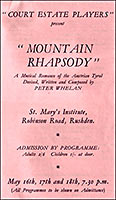 |
|
Programme
|
|
Shortly after that I wrote a play called “Mountain Rhapsody” for puppets and when the people that were going to do the voices read it they said. ‘This is too good for puppets, let’s do it ourselves.’ So, of course, I was flabbergasted but delighted. It was the farthest thing from my mind to do a large show, so a lot of re-writing, extra music to be written etc. And that was how basically we, the Court Estate Players, started because music invitations to do concerts, which we didn’t do any longer. So I changed the name to the Court Estate Players and from then on it was doing more or less full length musical shows that I wrote for the players. |
This went on right up until 1972, or thereabouts, and we folded then mainly through not getting enough people to fill parts. There were two shows that I wrote that weren’t, we couldn’t perform, because we couldn’t get the people for them. So we decided to call it a day but we still did the odd social event for “Rushden Club for the Disabled” which we had decided some years earlier to help out financially and to provide finances to buy them wheelchairs. That went on until about, oh the middle 70s, and I used to help out with the choir that was in the Catholic Church in Rushden.
Eventually in, I think 1978, I was asked to become, to take over, which I did and I’ve been choirmaster ever since, I think for about thirty years now, I think, yes ’78. Then in 2002 our lady organist retired, she’d been playing I think for about forty or fifty years at the same church, she retired. So I’m now organist and conductor as well but and instead of writing shows, like I did in the past, I’m writing religious music now, masses and motets and things like that which I thoroughly enjoy, you know.
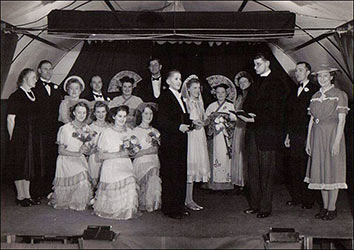 |
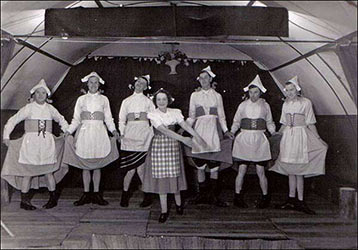 |
|
Court Estate Players on stage
|
The Court Estate Players used to perform in a little Nissen hut along Avenue Road which was used as a church on Sundays and I think for Sunday School and that. Of course with the shows and that the crowds got too big. Of course it was before health and safety but it was fire precautions, that sort of more or less decreed that we move out. So we went down to St. Mary’s Institute in Robinson Road and did the shows there. Then from there we used to go to Park Road Methodist, in the big hall there. That was, that was the goal, I mean that was a massive great hall and a lovely big stage and that. We performed the shows there and then eventually we went to, we used to go out to Melchbourne. Melchbourne became the try out place before we came into Rushden. Also we went over to Raunds a couple of times to do shows there. So, and that was right up until I say, up to 1970s and ’72 before we packed up but they were happy days.
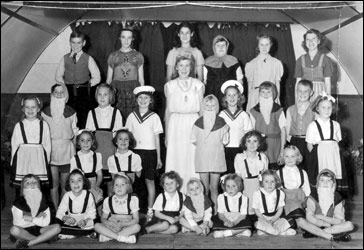 |
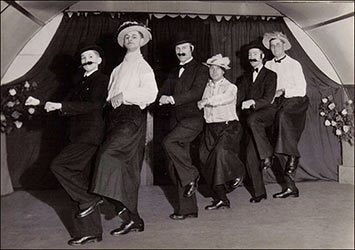 |
|
Young players
|
On stage
|
The thing about the shows was nobody, there was no sort of reason to say. ‘Oh I could do that part better than him, or better than her.’ because every part was written for that specific person and knew what they could do and the range of their voices. So nobody on the stage appeared to be straining or anything like that. There was, as Jean Hunt mentioned, some other articles about the players, they were a very happy crowd, you know, some of the happiest days of my life I suppose really. Apart from being, you know, the RAF days. But getting back to the choirs, I mean I ran several choirs at R.A.F. Halton and R.A.F. South Witham, and there again that was a choir show, sort of thing, but they were happy times and I loved doing it.